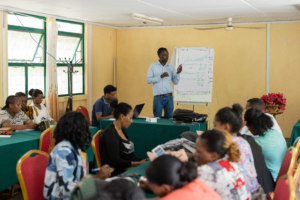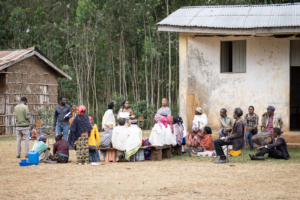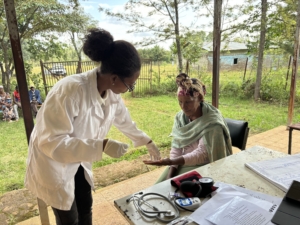Last week, at the United Nations High-Level Meeting on the Prevention and Control of Noncommunicable Diseases and the Promotion of Mental Health, global leaders showed strong support for a new declaration intended to advance an integrated response to mental health and non-communicable diseases. Non-communicable diseases (NCDs) are the leading cause of death and disability worldwide, and action is crucial: Last Mile Health stands in strong support of a united approach to combat this group of illnesses, and the declaration represents an important step toward this goal. However, the declaration’s draft language neglects to mention a crucial workforce in the fight against NCDs: community health workers.
In a new policy brief, we share evidence, lessons learned, and recommendations for continued research in training community health workers to address NCDs within their own communities. In 2024, in partnership with Ethiopia’s Ministry of Health, we launched a new training module equipping community health workers to screen for, diagnose, refer, treat, and manage common NCDs at the community level. In a country where the community health workforce numbers more than 40,000 and has driven measurable gains in maternal and child health, the training brings NCD care within reach for patients living far from any health facility. As we work alongside the Ministry of Health to scale the training with Ethiopia’s entire community health workforce, we are sharing this brief to broaden the reach of our learning, and to offer a potential model and key considerations for governments and partners seeking to implement NCD interventions at the community level.
Ethiopia’s community health workers have shown that it’s possible to address many non-communicable diseases through community-based primary care, and this option can be effective, cost-effective, and sustainable in today’s challenging financial landscape. But to do this, governments and partners must invest in community health workers and the systems that support them. And they must recognize the proven and potential impact of community health workers, naming their contributions and ensuring they are paid, trained, and supported as professionals and fully integrated into the health system.
We call on health leaders, government leaders, bilateral and multilateral partners, and the private sector, to fund, scale, and strengthen community-led primary healthcare for the prevention and treatment of NCDs—and to name and recognize community health workers for their demonstrated potential in bringing integrated primary care, including for NCDs, to the world’s most rural, remote, and vulnerable communities. For partners, peers, and individuals who seek to join us in advocating for community health workers as a key component in the global fight against NCDs, our new policy brief offers a primer on their promise and their demonstrated impact.

Community health workers attend Last Mile Health and the Ethiopia Ministry of Health’s training on non-communicable diseases
“I think we can bring about change,” says Zinash Bogale, a community health worker who regularly uses her training to screen community members for NCDs—and helps them manage their conditions in their homes and at the health post. “Our communities need these services, as many are suffering. If we have the training and equipment, we can do it!”






